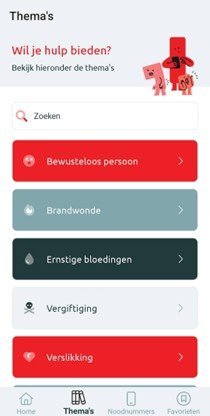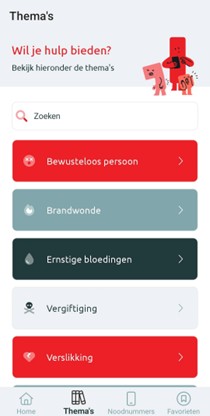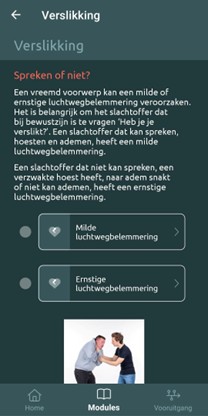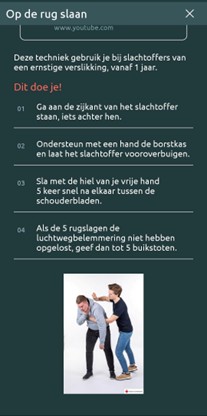3 in 4 Flemings don't know what to do when a baby suffocates

On International First Aid Day, Belgian Red Cross-Flanders releases figures from a recent survey of the population. This shows that 3 out of 4 Flemish people do not know what to do when a baby suffocates, for example in a toy or food. Half don't know what to do if an adult suffocates. "Lack of time is one of the biggest reasons why people don't take training courses, which is why this summer we launched a campaign for our free first aid app to lower that barrier."
"Our survey shows that the vast majority of Flemings would like to have a thorough first aid knowledge, but taking the final step to our free training courses is often still difficult. That's why we recommend our free First Aid app to Flemings who can't find the time. In it, we have brought together all our knowledge based on scientific research. With this you can learn in your own time some life-saving techniques that can make the difference," says Vincent Verbeecke, spokesman for Belgian Red Cross-Flanders.
Large gap between thinking and ability
Belgian Red Cross-Flanders also investigated how the Fleming assesses his own knowledge of resuscitation techniques. This yielded the following results:
- 55% report being able to perform CPR without an AED device.
- 43% report being able to perform CPR with AED device.
- 39% report knowing what to do if someone goes into cardiac arrest.
"This shows that more than half of Flemings say they can perform CPR. That's quite a lot, it's a very encouraging figure," says Verbeecke. "However, our own experience tells us that many people overestimate their CPR knowledge. During training, we often notice that there are points of attention: the placement of the hands, maintaining a (correct) rhythm, the depth of compression. These are always crucial factors to perform CPR successfully. But it shows that many Flemings are actively working on the topic."
In Belgium today, only about 1 in 10 people survive cardiac arrest. In countries like the Netherlands, that figure is almost twice as high. Quick and decisive response from bystanders can make a big difference there. "In cardiac arrest, every minute counts."
Lack of time is the biggest barrier
The survey further shows that only 6% have mastered the most important techniques. Conversely, nearly 90% of Flemings say they would like to have good first aid knowledge and 70% are interested in taking classes. Yet only 12% say they will effectively take training in the next two years.
"Previous research showed that the main reason for this discrepancy is lack of time," says Verbeecke. "People are busy, have other things on their minds. A first aid training can't always be included then, even though we offer it for free."
Free first aid app: knowledge in minutes a day
To remove that barrier, Belgian Red Cross-Flanders started a campaign for its free first aid app this summer. "In the app you will find step-by-step instructions for the most common emergency situations: from CPR to choking a baby. You can easily look up specific techniques and thus master the basic tricks of the trade," Verbeecke said. "This way, everyone can add to their knowledge at their own pace."

"Thorough training remains preferable, but with the app we want to provide an option for all those who do not find time to attend training immediately. In parallel, we are significantly scaling up our capacity for free training to respond to the high demand," Verbeecke said. "Responding correctly in an emergency situation instead of standing by helplessly makes a huge difference. It really can be about life or death."
The First Aid app is available for free download from the App Store and Google Play.
The figures come from a representative survey of 1,080 Flemings aged 18 and older. The survey was conducted in July 2025 by Bpact on behalf of Belgian Red Cross-Flanders. The sample is representative in terms of age, gender, province, level of education, urbanization and professional activity with a maximum margin of error of 2.98%.
Images of the free first aid app from Belgian Red Cross-Flanders


